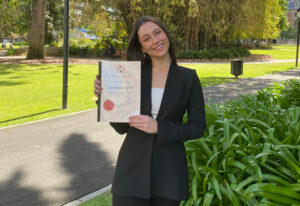Unlocking the Power of Connection: Dr Mark Williams Inspires Students

In the 21st century, the importance for our teens to develop essential ‘soft’ skills has never been more important. Skills like collaboration, cooperation, teamwork, communication, curiosity, creativity, and leadership are crucial for thriving in our modern world. At the heart of these skills lies a fundamental component: connection.
The Significance of Connection
Connection is not just a buzzword; it is the most important ingredient for a fulfilling life. Our ability to connect has propelled our species to remarkable heights of innovation, through collaboration and specialisation. Connection serves as our best defence against mental and physical health challenges.
Introducing Doctor Mark Williams
Doctor Mark Williams is an internationally recognised professor of cognitive neuroscience. He has dedicated over 25 years to conducting behavioural and brain imaging research focusing on our social skills. As one of the world’s leading authorities on the teen brain, he has published more than 70 scientific articles on the subject. With his academic background, Dr Williams is uniquely positioned to communicate complex neuroscience concepts with clarity and authority. Mark is passionate about giving young people the latest knowledge about how their brain works so that they (and their brains!) can thrive.

Empowering Students at Santa Maria College
After the success of his first visit to Santa Maria College last year, we were excited to welcome Dr Williams back to talk with our Years 7, 8 and 9 students this week. During his visit, Dr Williams shared with the students how human brains have evolved to enable us to connect. He delved into the importance of connection for our wellbeing and the survival of our species. By learning about the power of human connection, students are now better equipped to work together towards a more united and sustainable future.

A Collaborative Approach
Catherine Kolomyjec from The Kindness Challenge has again partnered with Dr Williams for his visit to Perth. As a trauma-specialist social worker, a Stanford Global Ambassador for Applied Compassion, and a former student of Santa Maria College, Catherine facilitated the session, ensuring that the students were actively involved in the discussions and had the opportunity to ask questions. Together, Dr Williams and Catherine guided the students to a deeper understanding of the profound impact their connections and their brains can have on their physical and mental wellbeing.
“We were both so excited about Mark coming back to Perth, and this special opportunity to chat with the Santa Maria students about what it means to be human, their extraordinary teenage brains and what we can all do to improve our human lives”, Catherine said.

Year 9 student Stephanie Kerr found Dr William presentation valuable. “He was very informative and spoke very passionately! I personally, am very interested in neuroscience, after doing close to two terms of study on it in Year 8 IGNITE. So, I went into the period very excited! I was able to ask a few questions during the talk and was able to give my thanks after everyone had left. He was so friendly and eager to answer any more queries I had! All in all, I feel very fortunate to be at today’s presentation!
In a world where the ability to connect is increasingly vital, Dr Williams’s visit to Santa Maria served as a powerful reminder of the significance of human connection. As Stephanie expressed, Dr Williams’s passion and expertise left a lasting impression, reinforcing the importance of unlocking the power of connection in our lives.
Thank you to Dr Williams and Catherine for sharing this valuable message with our students.


Caitlyn Goldney (2013) Embarks On A Legal Career
Caitlyn Goldney (2013) is a passionate advocate dedicated to giving back to the community through her legal savoir faire.

Combating The Attention Span Crisis In Our Students – Jennifer Oaten
It is no secret that attention spans have been steadily declining, especially among younger generations growing up immersed in digital technology. The average person’s attention span when using a digital device has plummeted from around two and a half minutes back in 2004 to just 47 seconds on average today – a dramatic 66% decrease over the past two decades.

Weekly Wrap Up: Term 2, Week 2, 2024
Week 2 has come to an end! This Weekly Wrap Up features highlights from Scuba Diving Club, the Sisterhood Series, and Boarding ANZAC Service.
- Featured, Learning for Life
Author: Santa Maria College
Santa Maria College is a vibrant girls school with a growing local presence and reputation. Our Mission is to educate young Mercy women who act with courage and compassion to enrich our world. Santa Maria College is located in Attadale in Western Australia, 16 km from the Perth CBD. We offer a Catholic education for girls in Years 5 – 12 and have 1300 students, including 152 boarders.






